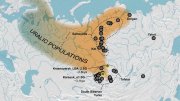Metaphors of touch infiltrate our language. When something goes easily, we say it was smooth sailing; an uncouth person is coarse. We have a soft spot for someone we love; the opposite is being hard-hearted. In fact, it is difficult to escape these metaphors: try to think of a synonym for rough day, and hard day probably comes to mind first.
Thus, the ways we describe the world draw on tactile sensations and the emotions associated with them. But research by psychology doctoral student Christopher Nocera suggests that the connections go both ways: that the sensations themselves have a powerful effect on how we perceive situations--and on how we respond.
Nocera and his colleagues, Yale professor of psychology John Bargh and MIT assistant professor of marketing Joshua Ackerman, asked study participants to read a passage about an ambiguous social interaction: one in which comments, motivations, and outcomes could be interpreted in more than one way. Just before reading the passage, the participants were asked to complete a puzzle; those who had handled rough puzzle pieces--covered in sandpaper--rated the interaction they read about as more adversarial than did participants whose puzzle pieces were smooth. Participants who handled a wooden block rather than a blanket before reading a passage about an employee-supervisor interaction were harsher judges of the employee’s personality on a subsequent questionnaire.
A third experiment tested similar influences in a situation with more at stake: the researchers asked participants to rank job candidates based only on a résumé. Subjects who received the résumé on a heavy clipboard ranked the candidate as more qualified than those who read the same résumé on a lighter clipboard. Nocera believes this is because we equate heavy with serious; a heavy object may broadcast competence the way professional attire or a firm handshake does (see “The Psyche on Automatic,” page 48).
These tactile cues can influence our impressions--but they may also influence actions. In one example, study participants who sat in hard chairs drove harder bargains in a hypothetical negotiation over a new car: after learning that the dealer had rejected their initial offer, they raised their price less for the second offer than participants seated in a soft, cushioned chair.
Such findings suggest that tactile input is “coming inside in a metaphorical way and then going back out,” says Nocera. The study results, published in Science this year, join a small but growing body of research, including earlier work by Bargh that found that people were more generous after holding a warm drink than a cold one. One forthcoming study by Nocera found that subjects who had handled sandpaper were more likely to fall off a low-slung tightrope than those who had touched something smooth before walking the rope. Another (by Nocera and psychology research fellow Omar Sultan Haque) examined the effect of performing movements associated with religion, such as kneeling and prostrating; people who performed such movements reported stronger attitudes of conformity afterwards.
Nocera, whose dissertation will investigate the evolutionary roots and social overlays of physical gestures (such as shrinking back from something disgusting), says that the way we perceive the world is deeply enmeshed in our sense of touch, and this foundation is laid early in life--in fact, before birth. During fetal development, touch is the first of the five senses to develop. During infancy, he says, “we learn to feel a sense of warmth and safety from things like a soft blanket.” In this way, emotional qualities become aligned with certain tactile sensations, and, he says, “I think we probably carry those with us the rest of our lives.”
Understanding these associations may have implications for job interviews, negotiations, and other high-stakes social situations--but also for how we construct our surroundings and conduct ourselves. “If emotions are highly influenced by the body,” says Nocera, “then people need to know.”








